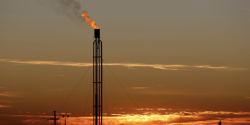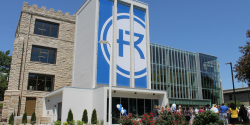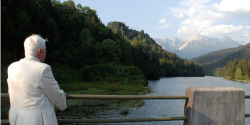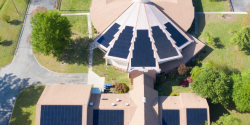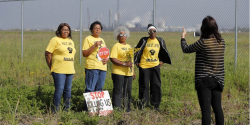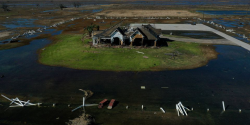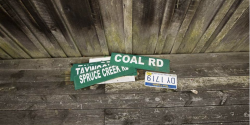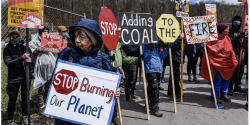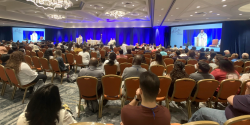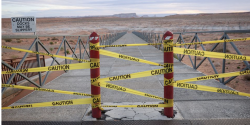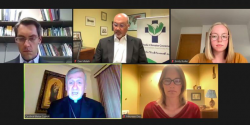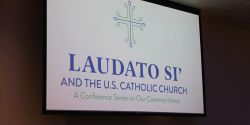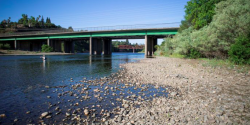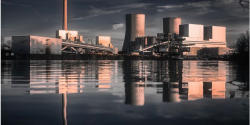For media inquiries or to request an interview with a Covenant principal, please contact elena@catholicclimatecovenant.org (202) 907-9717.

The State of the Union is usually heavily scripted, as the president lays out plans for the country. But one of President Joe Biden's most important remarks during the Feb. 7 address may have been improvised.
While talking about soaring corporate profits, he noted that the oil industry took home $200 billion in profits last year. He said executives justified this by telling him they were afraid he would shut down oil refineries anyway, so why would they invest in increasing domestic production?
"We are going to need oil for at least another decade," the president responded during the speech, earning guffaws from some in the chamber. Apparently many in the audience simply couldn't imagine a world without oil — 10 years feels so unrealistic that it must have been meant as a joke.
But the president wasn't joking.
The oldest building at Rockhurst University is now the greenest on campus.
When the doors of Sedgwick Hall first opened in 1914, the four-story, stone-block structure along Troost Avenue housed the college, the high school and residence for the Society of Jesus at the Jesuit institution here in Kansas City. Essentially, it was Rockhurst.
Beginning with the fall 2022 semester, Sedgwick Hall has become home to the new St. Luke's College of Nursing and Health Sciences. Rather than tear down the century-old center of academia, university officials opted instead to undergo a multiyear $23.5 million renovation, a project not only to preserve the campus landmark as a bridge between the school's past and future, but also to repurpose the building in a sustainable way.
As nearly 200,000 people waited in lines outside St. Peter's Basilica this week to pay their final respects to Pope Emeritus Benedict XVI, it's likely more than a few spotted the glimmer of sunlight reflecting off the roof of a nearby building.
The source, 2,400 solar panels atop the Paul VI Audience Hall, stands as a lasting symbol at the Vatican of the focus that Benedict, who died Dec. 31 at age 95, placed on environmental issues during his eight-year papacy, which ended in 2013, when he became the first pope to resign in 600 years.
WASHINGTON (CNS) -- A provision in the Inflation Reduction Act, signed into law this summer by President Joe Biden, not only increases the size of the tax credit for conversions to renewable energy but also makes nonprofit entities, like parishes, eligible to receive the tax benefits themselves.
The new program starts Jan. 1. Rules have yet to be published denoting how it will work.
Even without the rules yet in place, "we're pushing it ourselves," Dan Misleh, executive director of the Catholic Climate Covenant, told Catholic News Service. "Our Catholic Energies team is pushing it. It's going to make a lot more projects viable."
Everyday Ignatian: Unmute the Voice of Creation
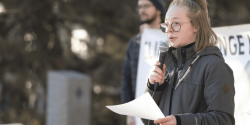
I sat at my desk, eyes glued to Zoom. My hand shook as it hovered the cursor over the microphone button. I took a deep breath, straightened my posture and unmuted. Although my hands still shook, my voice was steady. I spoke to Pope Francis — or his little Zoom square, at least.
I told Pope Francis that climate change inaction, even within the Catholic Church, is perpetuating violence on our common home. I told him that young Catholics are anxious and afraid of our futures, as there is a rapidly closing window to avoid climate catastrophe. I didn’t say these things because I thought the Holy Father needed a lesson in climate change; in fact, I’m positive that he understands our ecological reality. I said these things because this was a synodal event, and the pope wanted to hear from students. Tasked with sharing the hopes, dreams and anxieties of young Catholics today, I shared what was on my heart and the hearts of the other young Catholics I represented: Creation is crying out, and we’re not listening.
Environmental justice advocates in southern Louisiana declared victory last week after two decisions denied two major petrochemical complexes from moving forward in their community.
On Sept. 14, state district court Judge Trudy White released a decision that reversed and vacated 14 air regulations permits that the Louisiana Department of Environmental Quality (LDEQ) had issued for the proposed Formosa Plastics Group complex in the town of Welcome. The majority Black town is situated in a corridor of oil refineries and industrial plants between New Orleans and Baton Rouge often referred to as "Cancer Alley."
SoPs join climate action projects

We, the Providence Community, are motivated to care for God’s wondrous creation and be responsible stewards of the resources God has given us. For years, the Sisters of Providence and our associates have worked to actively address the world’s urgent environment and social problems. We have made personal and corporate commitments to reduce our carbon footprint through lifestyle changes by reducing energy usage, meat consumption and use of single-use plastics. We have committed to other measures as well. However, we are poignantly aware that, try as we might, it is virtually impossible to eliminate all personal and corporate greenhouse emissions. Now we have found a tool to help us “pay back” for some of those emissions.
How faith groups helped pass the climate law
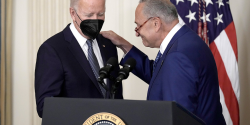
Hours into last month’s debate over one of the most significant pieces of climate legislation ever passed, Maryland’s senior senator turned his remarks to Jewish tradition.
Sen. Ben Cardin, who is Jewish, noted that discussion of the Inflation Reduction Act, with $369 billion in funding for climate and energy at stake, coincided with Tisha B’Av, a time of Jewish collective mourning over historic tragedies.
The Democrat’s comments stemmed from Dahlia Rockowitz, a leader for the group Dayenu: A Jewish Call to Climate Action, who had reached out to Cardin’s office over the parallel.
“As she pointed out,” Cardin said, “according to Jewish tradition, this day of despair is also the day that new hope and the potential of a rebuilt, reimagined, redeemed world is born. These investments in clean energy and transportation can help us emerge from climate-fueled disasters to a more hopeful, clean energy future for generations to come.”
Faith groups have long called for climate action, connecting with lawmakers across the political spectrum on an issue that has often sparked partisan division.
When Pope Francis presents Bishop Robert McElroy with his red hat on Saturday, Aug. 27, officially making him a cardinal in the Catholic Church, he will elevate one of the top supporters of the themes of his pontificate in the U.S., including on environmental issues and the message of the pope's landmark encyclical "Laudato Si', on Care for Our Common Home."
Appointed bishop of San Diego two months before Francis issued in June 2015 the first papal teaching document dedicated to ecological concerns, McElroy has been among the most outspoken in addressing climate change and environmental justice, but also transforming the encyclical's words into actions.
The story starts off simple enough.
A woman starts a social justice group at her Catholic parish.
During one particular meeting, she begins to talk about "Laudato Si', on Care for Our Common Home," Pope Francis' 2015 encyclical on ecology.
But she was quickly cut off.
"We shouldn't rock the boat," she said her pastor told her, as he felt the papal teaching document, the first ever devoted entirely to issues of the environment and humanity's relationship with the rest of the created world, was too controversial.
Landmark legislation to address climate change, reduce prescription drug costs and establish a minimum tax on large corporations once thought dead but was suddenly passed by the Senate is being hailed by Catholic advocates.
“It’s a minor miracle that it got passed,” Dan Misleh, founder of the Catholic Climate Covenant, said of the Inflation Reduction Act, which was approved 51-50 Aug. 7. Vice President Kamala Harris cast the deciding vote.
Misleh and his organization have long advocated for passage of the climate-related components of the renamed bill, a pared down version of President Joe Biden’s original $2-trillion Build Back Better plan.
The bill includes $369 billion in funding for investments in clean energy, domestic manufacturing of batteries and solar panels, electric vehicle tax breaks and greenhouse gas reduction efforts.
The U.S. Supreme Court's decision last week to curtail the Environmental Protection Agency's ability to regulate greenhouse gas emissions from power plants was met with disbelief and disappointment by Catholic and other faith groups, calling it "a moral travesty" with serious repercussions for both people and the climate.
The consequential ruling, issued June 30 in one of the final cases of a monumental term for the court, dealt a major blow to one of the federal government's tools to reduce the heat-trapping gases, which are driving climate change, from one of the nation's largest emitting sources: coal- and gas-fired power plants. It also raised questions about what leeway other federal agencies will have to interpret laws and directives they've been tasked to enforce.
In a statement, the Catholic Climate Covenant said it was "deeply disappointed" by the Supreme Court's decision.
Advocates expressed disappointment that the U.S. Supreme Court has limited Environmental Protection Agency action to reduce greenhouse gas emissions from power plants, but said they will continue to push Congress to enact much-needed climate change legislation.
“We want to focus on getting ambitious and urgent climate solutions implemented now, recognizing that the window is closing on this opportunity based on the scientific evidence,” said Jose Aguto, executive director of the Catholic Climate Covenant.
The covenant will mobilize its “Encounter for Our Common Home” initiative that finds people working in parishes and through national and local organizations to contact members of Congress about vital environmental protection issues.
Finding healing and exploring ways to work more effectively with diverse communities was the focus of the general session on the second day of the “Alive in Christ: Young, Diverse, Prophetic Voices Journeying Together,” a multicultural national gathering of Catholic ministry leaders in Chicago June 23-26.
Over 300 Catholic ministry leaders, young adults and bishops from dioceses and parishes around the country listened to the panelists who spoke about the importance of embracing historical memories in their cultures and faith.
Anna Robertson recalled learning about historical memory in a rural town in El Salvador, where young people were committed to preserving the memory of the civil war in that country and the suffering of their communities so that history would not repeat itself.
With prospects for substantial climate change legislation fading as midterm elections draw closer, a major Catholic campaign is bringing constituents straight to their senators, writes reporter Brian Roewe in National Catholic Reporter.
Amadou Diallo, a program manager for Catholic Relief Services in his native Senegal, knows from talking with the farmers and cattle herders that the cyclical droughts the country experienced occurred about once every 10 years for generations.
More recently, he has learned from conversations with them that the droughts occur more often, perhaps every three or four years, and are unpredictable in duration.
The more frequent droughts cause the herders to take their cattle elsewhere, possibly opening the way to conflict. For people who grow crops to sell, their yields are smaller, limiting their ability to provide enough food for their families. At times, parents pull their children from school and send them to work to help support their families.
Grim but not hopeless. A foreboding future but the potential for a better one, if immediate, systemic and sustainable action is taken. An urgent need to adapt to increasingly extreme weather. And a key role for faith communities in all of it.
Those were among the responses of religious groups and their allies to Monday's major report on climate science from the United Nations Intergovernmental Panel on Climate Change.
For three days in online spaces and forums, thousands of Catholics looked to prime the U.S. church for a fuller-throated response to climate change and Pope Francis' invitation to become a central component in the global response to the ecological challenges facing the world.
More than 2,600 people registered for the virtual "Laudato Si' and the U.S. Catholic Church" conference, the second of three co-organized by Catholic Climate Covenant and Creighton University to amplify the country's response to Francis' 2015 encyclical "Laudato Si', on Care for Our Common Home." The first gathering took place in 2019 on the Jesuit campus in Omaha, Nebraska, and the final is set for 2023.
Much of this middle conference, held July 13-15, was geared toward updates and preparations for the full release of the Vatican's Laudato Si' Action Platform in the fall. The ambitious project, developed by the Dicastery for Promoting Integral Human Development, invites church institutions large and small to commit to seven-year plans toward total sustainability, including becoming carbon neutral and expanding ecological education, in the spirit of Laudato Si'.
A bolder embrace of Laudato Si' in the U.S. requires rejecting individualism, indifference and the "false idol of economic growth" that permits reckless exploitation of the environment, Chicago Cardinal Blase Cupich said at the start of a conference seeking to bolster the response of the nation's Catholics to climate change and the pope's landmark ecological encyclical.
Cupich challenged Catholics to see sacrifice as "essential to saving our planet" and called on young people to meet with their bishops and priests to share their concerns about climate change and urge them to speak out on the environmental challenges facing the world.
"I am convinced that it is useless to talk about advancing a culture of life absent a vigorous commitment — both by individuals and communities — to making the sacrifices required for improving the socioeconomic, ecological and political crises of our time," Cupich said.
The cardinal's remarks came during the opening event at the second "Laudato Si' and the U.S. Catholic Church" conference co-hosted by the Catholic Climate Covenant and Creighton University. The three-day conference, the second in a series of three biennial gatherings, is an effort to mobilize greater action within the U.S. church in response to Pope Francis' 2015 encyclical, "Laudato Si', on Care for Our Common Home."
Have Catholics in the United States made any progress in responding to environmental challenges? Have new pathways of cooperation opened up between the church and the White House under President Joe Biden? And how much enthusiasm is there across the country to join the Vatican's ambitious push toward total sustainability this decade?
The months leading up to the Vatican's unveiling of its Laudato Si' Action Platform in late May were filled with meetings among many people around the world.
In assembling the ambitious initiative to make the global church a beacon of faith-fueled sustainability, the Vatican consulted far and wide and assembled a web of working groups to offer feedback and fine-tune the massive undertaking.
WASHINGTON, D.C. — Faith has taught that water can be powerful, from a baby’s baptism to Noah’s Ark and the Great Flood.
To millions in the West, a flood is the last thing on their minds right now. The region is experiencing its second drought in a decade, and the severity of the current drought’s second year resembles that of the third year of the 2012-16 drought.
The U.S. Drought Monitor, which is updated weekly, puts 84 percent of the West in drought, with 47 percent in the most extreme drought status.
Mass marks environmental encyclical
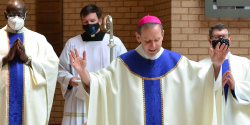
Bishop Michael F. Burbidge celebrated Mass at St. Bernadette Church in Springfield May 16 to commemorate the feast of the Ascension and the closing of the church’s "Laudato Si: on Care for our Common Home’ " anniversary year. The year marked the fifth anniversary of Pope Francis’ encyclical on the environment and begins a seven-year period in which he hopes to galvanize the world community to preserve our planet, and with it, human life.
Recalling the message of the Lord’s Ascension, Bishop Burbidge reminded the congregation that Jesus expects us not merely to "stand looking up into heaven," but to bring about the kingdom of God on earth. ..,
Catholic Energies, a service of the Catholic Climate Covenant, helped three parishes through the process by examining several factors, such as a parish’s energy consumption and what the utility company charges them, to see if switching to solar would help their bottom line.
CLEVELAND — Faith-based organizations working to address climate change and strengthen creation care initiatives are being heard again by the federal government.
Since President Joe Biden took office Jan. 20 and began shifting federal priorities toward achieving a greener country and addressing environmental justice in poor, minority and Indigenous communities, the organizations see a new opening for cooperation and dialogue.
“Doors are open. The administration has its own plans that parallel with what all of our groups are pushing for. It’s a brand new day for those us working for environmental justice,” said Stephen Schneck, executive director of the Franciscan Action Network in Washington.
Catholic support for a price on carbon dioxide emissions was on display during a weekend climate change conference, where two bishops, an environmental leader and former Vatican ambassador touted it as a critical climate solution that is both effective and "eminently doable."
Bishops John Stowe of Lexington, Kentucky, and Robert McElroy of San Diego both backed the idea of a carbon tax on coal, oil and gas companies, which would be redistributed to Americans in the form of a dividend.
McElroy said it is the responsibility of people of faith to "raise the alarm" about climate change and demand real solutions from public officials.
"The carbon tax is a central element of that, because it's a way of ensuring, in an economically sound manner, that the carbon we put into the atmosphere is reduced in the years to come," he said.
Just as important, he added, "it's eminently doable."
- 1 of 17
- next ›





